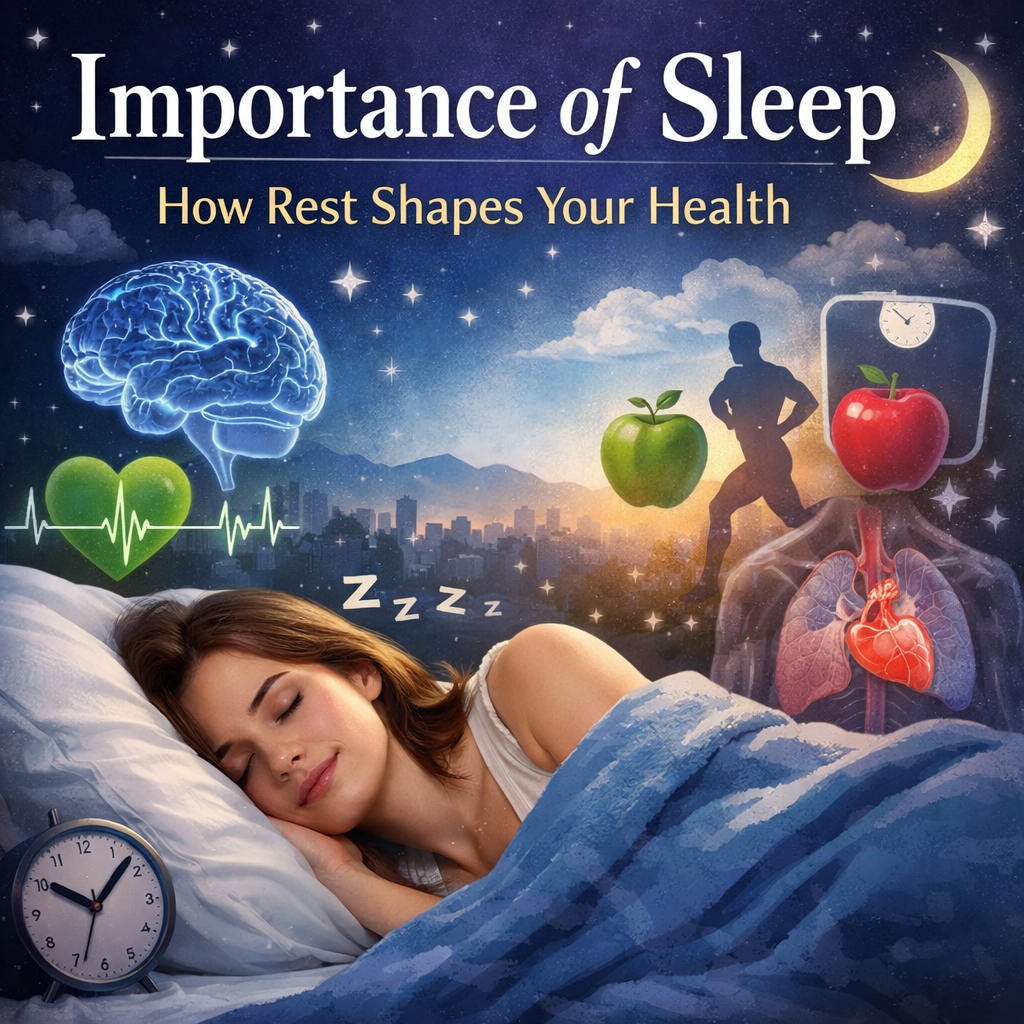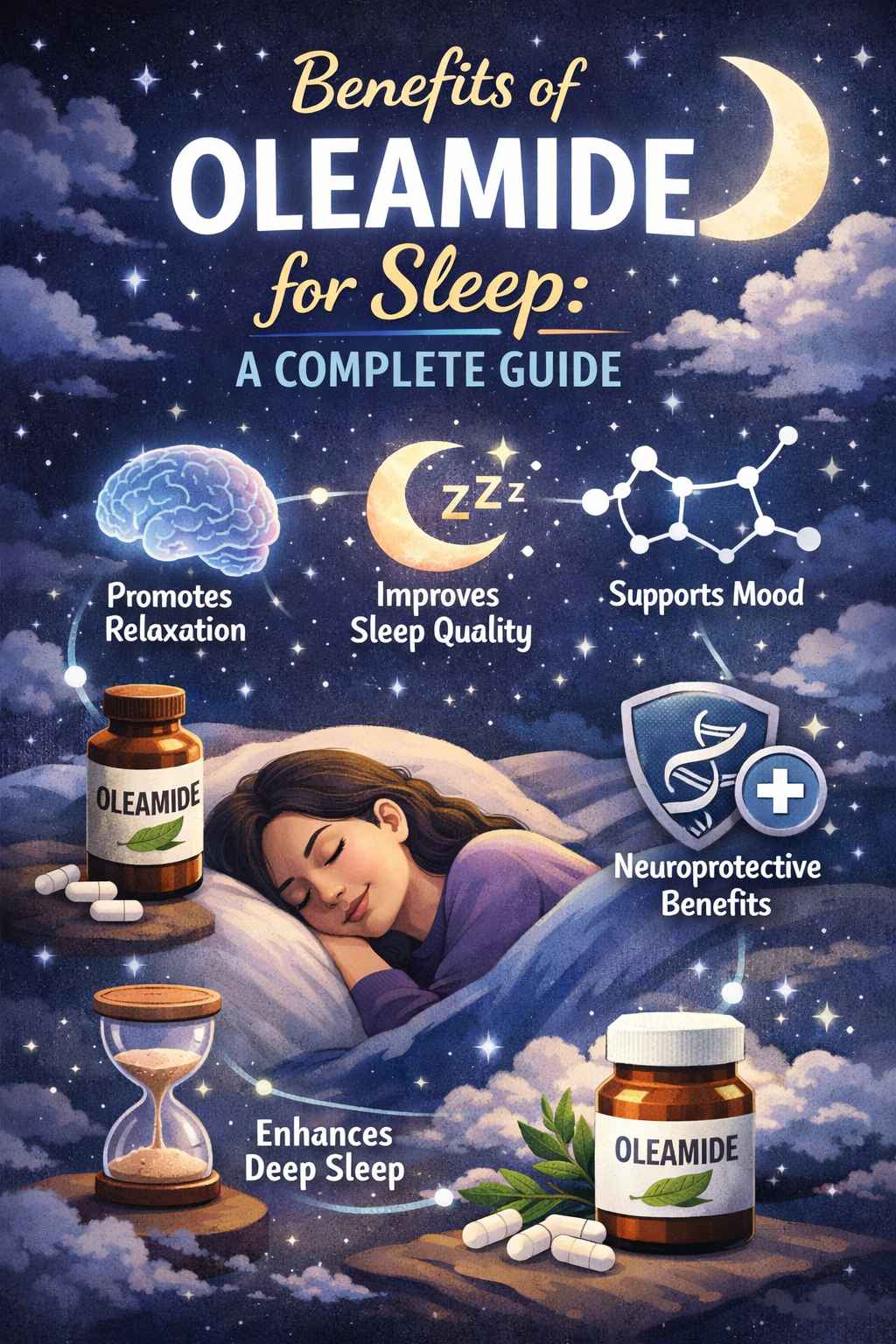The Importance Of Sleep: Top Reasons It Matters For Your Health And Well-Being
Sleep is not a luxury or an afterthought. The importance of sleep rivals food, movement, and meaningful connection as a foundation of health. When sleep is consistently short, shallow, or fragmented, every system in the body pays a price—often quietly at first, then loudly over time.
For health-conscious professionals, wellness enthusiasts, and anyone living with long-term sleep difficulties, understanding why sleep matters is more than an academic exercise. It is a practical way to protect your energy, mood, clarity, and long-term health—and to choose approaches that genuinely restore you, rather than simply knock you out.
Resources such as SLP1’s get to sleep support formula and deeper sleep product are designed for exactly this purpose: helping you fall asleep, stay asleep, and reach the deep, restorative stages your body depends on.
In the sections below, you’ll see how consistent, high-quality sleep supports almost every part of your health and well-being.
Why The Importance Of Sleep Rivals Diet And Exercise

Sleep, nutrition, and physical activity form three interdependent pillars. When one falters, the other two bend under the strain.
-
Poor sleep increases cravings for high-sugar and high-fat foods and makes it harder to resist them.
-
Fatigue reduces your desire to exercise and your ability to train effectively.
-
A healthier diet and regular movement, in turn, often make it easier to fall asleep and experience deeper rest.
During sleep, your body is far from idle. It is repairing tissues, regulating hormones, consolidating memories, and recalibrating the nervous system. This is why the importance of sleep shows up not only as “feeling tired” but also in blood pressure readings, blood sugar levels, emotional balance, and even how patient you feel in traffic.
“Sleep is the single most effective thing we can do to reset our brain and body health each day.”
— Matthew Walker, PhD, neuroscientist and author of Why We Sleep
To understand these effects in more depth, SLP1’s overview of the science of sleep explains how night-time physiology shapes daytime health.
The Importance Of Sleep Across The Lifespan
Another way to appreciate the importance of sleep is to look at how much we need at different ages. Requirements shift as we grow, but the need for consistent, quality rest never disappears.
Below are general daily sleep recommendations from major health organizations:
|
Age Group |
Recommended Hours (Per 24 Hours) |
|---|---|
|
Newborns (0–3 months) |
14–17 hours |
|
Infants (4–12 months) |
12–16 hours (including naps) |
|
Toddlers (1–2 years) |
11–14 hours (including naps) |
|
Preschoolers (3–5 years) |
10–13 hours (including naps) |
|
School-age (6–12 years) |
9–12 hours |
|
Teens (13–17 years) |
8–10 hours |
|
Adults (18–60 years) |
7 or more hours |
|
Adults (61–64 years) |
7–9 hours |
|
Adults (65+ years) |
7–8 hours |
A tiny minority of people—so-called “short sleepers”—appear to do well on much less. For most of us, regularly sleeping under these ranges slowly erodes health, even if caffeine and willpower mask the damage for years. If you routinely wake with an alarm and feel groggy or irritable, that’s often a sign you are not getting the amount of sleep your body needs.
Quantity matters, but the importance of sleep also lies in quality: drifting into deep stages, cycling through the night without frequent awakenings, and waking up feeling genuinely restored.
What Happens While You Sleep: A Quick Look At Sleep Stages

Understanding what happens during the night makes the importance of sleep feel tangible rather than abstract.
Non-REM Sleep (Stages 1–3)
-
Stage 1 (Light Sleep)
You transition from wakefulness to sleep. Heart rate and breathing begin to slow. This stage is brief but sets the tone for the night. -
Stage 2 (Deeper Light Sleep)
Body temperature drops, muscles relax further, and brain waves slow with brief bursts of activity. You spend a significant portion of the night here. -
Stage 3 (Deep, Slow-Wave Sleep)
This is the deeply restorative phase that SLP1’s deeper sleep product is designed to support. Blood pressure falls, growth hormone is released, and cellular repair takes center stage. Deep sleep is especially important for immune function, physical recovery, and metabolic health.
REM Sleep
Rapid Eye Movement (REM) sleep is when vivid dreaming occurs. Brain activity becomes more similar to wakefulness, but your muscles remain relaxed. REM plays a major role in:
-
Memory consolidation
-
Emotional processing
-
Creative problem-solving
Cycling smoothly through non-REM and REM several times each night is one reason the importance of sleep shows up so strongly in mental clarity and emotional balance the next day. For a deeper dive into these stages, SLP1’s page on the science of sleep offers a clear, research-based explanation.
The Importance Of Sleep For Physical Health
From your heart to your immune system, sleep acts as a nightly maintenance window for the body.
Cardiovascular Health

During non-REM deep sleep, your heart rate and blood pressure naturally drop. This nightly “rest period” gives your cardiovascular system a chance to recover from daytime stress.
Consistently short or fragmented sleep is associated with:
-
Higher risk of high blood pressure
-
Greater likelihood of coronary artery disease and heart attacks
-
Increased risk of stroke
“You’re not healthy unless your sleep is healthy.”
— Dr. William C. Dement, pioneering sleep researcher
By supporting more deeper sleep, you give your heart and blood vessels time to recalibrate and repair.
Metabolism, Weight Management, And Hormones
The importance of sleep is especially clear when you look at metabolism:
-
Ghrelin and leptin: Sleep loss increases ghrelin (which stimulates hunger) and lowers leptin (which signals fullness), making overeating far more likely.
-
Insulin sensitivity: Poor sleep reduces your cells’ response to insulin, raising the risk of type 2 diabetes.
-
Basal metabolic rate: Ongoing sleep restriction can lower the calories you burn at rest, making weight loss more difficult.
Many people trying to manage their weight focus on calories and exercise while overlooking the importance of sleep. Without steady, restorative rest, the body quietly shifts toward fat storage and cravings for fast energy. That is one reason consistent sleep often makes healthy eating feel less like an uphill battle.
Immune Function And Inflammation
While you sleep, your immune system releases proteins called cytokines and activates specific immune cells that fight infection and control inflammation. If you repeatedly cut sleep short:
-
You become more likely to catch viral infections.
-
Recovery from illness can take longer.
-
Low-grade inflammation may rise, which is linked with heart disease, mood disorders, and chronic pain.
Quality, deeper sleep essentially acts as a nightly tune-up for your defenses.
The Importance Of Sleep For Mental Health And Cognitive Performance

For many professionals, the most immediate sign of the importance of sleep shows up at the desk, in the meeting room, or behind the wheel.
Learning, Focus, And Memory
Sleep plays a central role in how the brain learns and remembers:
-
During the night, your brain replays and organizes the day’s experiences.
-
Short-term memories that mattered get stored as long-term memories.
-
Irrelevant information is pared away to reduce mental clutter.
When you sacrifice sleep:
-
Focus and attention drop.
-
Mistakes become more common.
-
New information is harder to retain.
Deep stages of deeper sleep and REM are especially important here, which is why sleep before an exam, presentation, or major decision is often more helpful than another hour of cramming.
Emotional Regulation And Stress
The importance of sleep extends deeply into emotional life. Adequate rest helps:
-
Smooth out irritability and abrupt mood swings.
-
Lower evening and night-time cortisol, the main stress hormone.
-
Support neurotransmitters tied to motivation, calm, and contentment.
By contrast, poor sleep can magnify anxiety and depressive symptoms, make minor problems feel overwhelming, and strain relationships at work and at home.
For many parents, particularly mothers balancing careers and caregiving, the SLP1 resource “Reclaim Your Sleep: The SLP1 Protocol For Moms To Win Their Sleep Back” offers structured guidance on restoring rest in the midst of demanding schedules.
Reaction Time And Safety
From driving to clinical decision-making, reaction time is a quiet marker of the importance of sleep. After a long day followed by short rest:
-
Response times slow dramatically.
-
Risk assessment becomes less reliable.
-
Errors—sometimes serious ones—increase.
Research has shown that severe sleep loss can impair driving as much as being legally intoxicated. For people in safety-critical roles, honoring the importance of sleep is also a responsibility to others.
When Poor Sleep Becomes A Sleep Disorder
Sometimes the problem is not just late nights or busy schedules. Underlying sleep disorders can block restorative rest even when you give yourself enough time in bed.
Common examples include:
-
Insomnia: Persistent difficulty falling asleep, staying asleep, or waking too early.
-
Sleep apnea: Repeated pauses in breathing during sleep, often accompanied by loud snoring and gasping.
-
Restless legs syndrome: An irresistible urge to move the legs, typically worse at night.
-
Narcolepsy: Overwhelming daytime sleepiness and sudden sleep episodes.
If you routinely:
-
Struggle for more than 30 minutes to fall asleep
-
Wake up often during the night
-
Feel exhausted despite what should be sufficient time in bed
it may be time to speak with a healthcare professional and consider a sleep evaluation. Journaling your patterns and reviewing foundational concepts on the science of sleep can make that conversation more productive. A simple sleep diary or data from a wearable device, while not perfect, can also help you notice patterns to share with your clinician.
Recognizing these conditions is another way of honoring the importance of sleep: not as a luxury to fit in when convenient, but as a core medical and psychological need.
Natural Ways To Support The Importance Of Sleep

Many readers prefer to explore natural, physiology-friendly supports before or alongside prescription sleep medications. When used thoughtfully, these approaches can complement sleep hygiene and help the body re-learn healthier patterns.
Creating A Sleep-Friendly Environment
A calm setting reinforces the importance of sleep by signaling safety and rest:
-
Keep the bedroom dark with blackout curtains or an eye mask.
-
Maintain a cool temperature, typically in the low to mid-60s °F.
-
Reduce noise with a fan, white-noise machine, or earplugs.
-
Reserve the bed for sleep and intimacy rather than work or scrolling.
If you consistently struggle to get to sleep, make the 60–90 minutes before bed as screen-light and stress-free as possible.
Protecting Your Sleep Rhythm
Your internal clock depends on regularity. Helpful practices include:
-
Going to bed and waking up at roughly the same time every day, including weekends.
-
Getting natural light exposure in the morning.
-
Avoiding heavy meals, caffeine, and alcohol in the late evening.
-
Limiting long or late-afternoon naps if they interfere with night-time sleep.
Many people are surprised at how powerfully these small commitments reinforce the importance of sleep in their daily lives.
Supporting The Nervous System
Gentle, body-based practices can help your mind and nervous system shift gears:
-
Slow breathing exercises
-
Brief mindfulness or meditation
-
Gentle stretching or yoga
-
Writing a brief “worry list” before bed so that your mind can set problems aside until morning
These approaches do not “force” sleep but remove some of the internal friction that keeps you awake.
Nutritional And Supplement Support
Certain nutrients and botanicals have been studied for their role in promoting deeper, calmer sleep:
-
Glycine – This amino acid may help lower core body temperature and promote more restful sleep. SLP1’s in-depth Glycine For Sleep guide explains how to use it wisely within a broader sleep plan.
-
Reishi mushroom – Traditionally used for calm and resilience, Reishi may support relaxation and more consistent sleep cycles. SLP1’s guide to the sleep-supporting properties of Reishi reviews the research and practical considerations.
-
Melatonin nasal spray – Melatonin helps regulate the sleep–wake cycle. Nasal spray formulations can be absorbed quickly and may support faster sleep onset, especially when circadian rhythms are disrupted. SLP1’s detailed guide to melatonin nasal spray explores timing, dosing, and safety.
For many, pairing these supports with SLP1’s get to sleep product and deeper sleep formula creates a bridge between restless nights and steadier, more restorative rest.
Always discuss new supplements with a healthcare provider, especially if you are pregnant, nursing, or taking other medications.
The Hidden Costs Of Ignoring The Importance Of Sleep
When the importance of sleep is minimized for months or years, the effects gradually move from subtle to unmistakable.
Physical Consequences
Long-term sleep deprivation is linked with:
-
Higher risk of heart disease, high blood pressure, and stroke
-
Increased likelihood of type 2 diabetes and weight gain
-
Greater susceptibility to infections and slower recovery
-
Exacerbation of chronic pain conditions
Because these changes accumulate quietly, it is easy to misinterpret them as “just getting older” rather than as signs that the body’s nightly repair window is repeatedly cut short.
Mental And Neurological Consequences
Over time, inadequate sleep can contribute to:
-
Persistent low mood and anxiety
-
Brain fog and memory difficulties
-
Reduced creativity and problem-solving capacity
-
Higher risk of neurodegenerative conditions such as Alzheimer’s disease, likely through impaired clearance of metabolic waste products in the brain
The importance of sleep reaches far beyond feeling rested—it shapes how you think, remember, and respond to life.
“The shorter your sleep, the shorter your life.”
— Matthew Walker, PhD
Work, Relationships, And Quality Of Life
Chronic under-sleeping can:
-
Lower productivity and accuracy at work
-
Increase tension at home due to irritability and impatience
-
Reduce enjoyment of hobbies, connection, and daily moments
-
Raise the risk of accidents, especially when driving or operating equipment
Behind many stories of burnout is a quiet disregard for the importance of sleep over many months or years.
Practical Ways To Honor The Importance Of Sleep
Putting this all together, here are key practices that respect the importance of sleep while fitting into a demanding life:
-
Treat sleep like a non-negotiable appointment. Schedule it with the same seriousness as meetings or workouts.
-
Start with one change at a time. For example, commit to a consistent wake time for two weeks, or set a nightly alarm to begin winding down.
-
Use supports thoughtfully. Natural aids, including glycine, Reishi, melatonin nasal spray, SLP1’s get to sleep formula, and deeper sleep product, work best when paired with stable habits and a calming pre-bed routine.
-
Seek guidance when needed. For parents, especially mothers, “Reclaim Your Sleep: The SLP1 Protocol For Moms To Win Their Sleep Back” offers step-by-step strategies adapted to irregular nights and caregiving demands. Persistent insomnia, loud snoring, or extreme daytime fatigue are reasons to involve a clinician.
Every small step that respects the importance of sleep—turning off screens earlier, saying no to one more late-night email, asking for help with nighttime caregiving—sends a signal to your body that restoration matters.
Conclusion: Making The Importance Of Sleep Central To Your Well-Being
When you look at the research and at lived experience, the importance of sleep becomes clear: it is a daily opportunity to restore the body, settle the mind, and support long-term health. It influences your heart, metabolism, immunity, memory, mood, and safety in ways that no supplement or productivity tactic can fully replace.
Understanding the science behind sleep is a first step. The next is choosing, day by day, to give yourself the conditions for deeper sleep, calmer nights, and clearer days—through habits, environment, and well-chosen supports such as SLP1’s get to sleep and deeper sleep products.
By bringing the importance of sleep to the center of your health priorities, you are not just chasing more energy. You are giving your body and mind the regular, profound reset they are designed to receive—so you can think clearly, feel steadily grounded, and live in closer alignment with what matters most to you.



Leave a comment
This site is protected by hCaptcha and the hCaptcha Privacy Policy and Terms of Service apply.